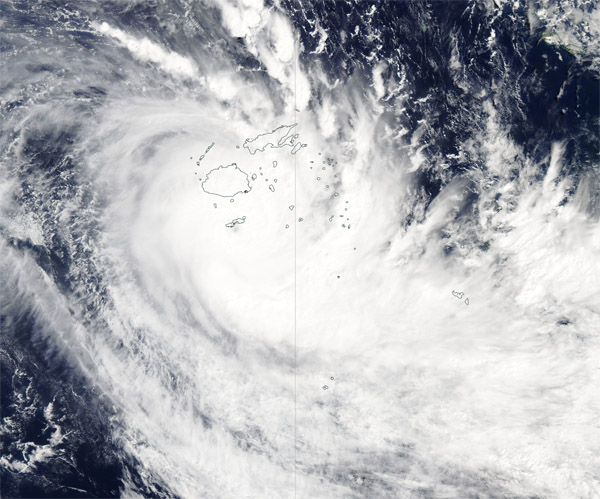Images
April 10, 2020 - Tropical Cyclone Harold over Fiji
Tweet
After battering Vanuatu, Tropical Cyclone Harold took aim at the island nation of Fiji. According to the Global Disaster Alert and Coordination System (GDACS), the storm make landfall on the morning of April 8, 2020 over Kadavu Island, Fiji. Maximum sustained winds at landfall were estimated at 220 km/h (137 mph), or the equivalent of Category 4 on the Saffir-Simpson Hurricane Wind Scale. After crossing Kadavu, Harold travelled southeast of the South Pacific Ocean and south of Tonga as it began to weaken.
At 10:00 a.m. EDT (1500 UTC) on April 9, the Joint Typhoon Warning Center issued the final warning on Harold, noting that the system had weakened to the strength of a Category 1 storm. Maximum sustained winds at that time were estimated at 148 km/h (92 mph). At that time, Harold was located near latitude 26.7 degrees south and longitude 166.1 degrees west, approximately 426 nautical miles south-southeast of Niue and was tracking east southeastward at 35 mph (56 km/h).
The impact of Harold has been significant across the South Pacific. In Vanuatu, media reports on April 9 described power and communication outages, damaged houses, and road damage across Espiritu Santo, Malo, and Malakula Islands. GDACS reported that about 70 percent of houses in Luganville, the largest town on Espiritu Santo, suffered damage from the storm. The situation in Fiji appears to also be severe, with damaged roads, homes, and power and communication outages, along with an unspecified number of injured people. On April 8, the Prime Minister of Tonga declared a state of emergency.
The Moderate Resolution Imaging Spectroradiometer (MODIS) on board NASA’s Aqua satellite acquired a true-color image of Tropical Cyclone Harold. The small, cloud-filled eye of the storm can be seen just to the southeast of Kadavu Island, Fiji.
Image Facts
Satellite:
Aqua
Date Acquired: 4/8/2020
Resolutions:
1km (3.8 MB), 500m (12.2 MB), 250m (37.6 MB)
Bands Used: 1,4,3
Image Credit:
MODIS Land Rapid Response Team, NASA GSFC
Tweet
After battering Vanuatu, Tropical Cyclone Harold took aim at the island nation of Fiji. According to the Global Disaster Alert and Coordination System (GDACS), the storm make landfall on the morning of April 8, 2020 over Kadavu Island, Fiji. Maximum sustained winds at landfall were estimated at 220 km/h (137 mph), or the equivalent of Category 4 on the Saffir-Simpson Hurricane Wind Scale. After crossing Kadavu, Harold travelled southeast of the South Pacific Ocean and south of Tonga as it began to weaken.
At 10:00 a.m. EDT (1500 UTC) on April 9, the Joint Typhoon Warning Center issued the final warning on Harold, noting that the system had weakened to the strength of a Category 1 storm. Maximum sustained winds at that time were estimated at 148 km/h (92 mph). At that time, Harold was located near latitude 26.7 degrees south and longitude 166.1 degrees west, approximately 426 nautical miles south-southeast of Niue and was tracking east southeastward at 35 mph (56 km/h).
The impact of Harold has been significant across the South Pacific. In Vanuatu, media reports on April 9 described power and communication outages, damaged houses, and road damage across Espiritu Santo, Malo, and Malakula Islands. GDACS reported that about 70 percent of houses in Luganville, the largest town on Espiritu Santo, suffered damage from the storm. The situation in Fiji appears to also be severe, with damaged roads, homes, and power and communication outages, along with an unspecified number of injured people. On April 8, the Prime Minister of Tonga declared a state of emergency.
The Moderate Resolution Imaging Spectroradiometer (MODIS) on board NASA’s Aqua satellite acquired a true-color image of Tropical Cyclone Harold. The small, cloud-filled eye of the storm can be seen just to the southeast of Kadavu Island, Fiji.
Image Facts
Satellite:
Aqua
Date Acquired: 4/8/2020
Resolutions:
1km (3.8 MB), 500m (12.2 MB), 250m (37.6 MB)
Bands Used: 1,4,3
Image Credit:
MODIS Land Rapid Response Team, NASA GSFC




